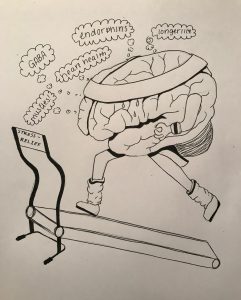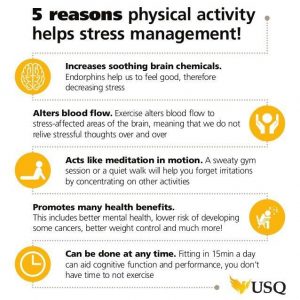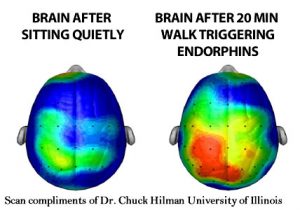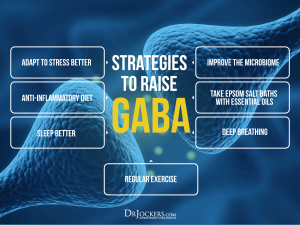
The Body:
What can’t it do?
It is no mystery that exercise is good for you. Why else would physical education be required in grade school? The extent of the importance of exercise is known oftentime people don’t know the entire picture. Sure, it increases heart health, controls weight, increases muscle mass but it also helps with a myriad of other things including regulating the effects of stress on the body.

Figure 1: There are many ways that exercise can benefit mental health and this figure is just a small snapshot of some of the ways that exercise reduces stress
A common effect that is seen with stress and several types of mental illness is insomnia. Exercising can increase sleep and sleep quality! Although the way that exercise benefits sleep is still unknown to scientists, researchers at John Hopkins medical school find that exercise increases the amount of slow wave sleep an individual gets. The more slow wave sleep, the more the body has a chance to heal and be ready for the next day.
There are many effects of exercise on the body and how it increases not only the quality of day to day life but overall life expectancy. The effects on the body are clearly notable, as said above, and have benefits on their own but improving overall self-esteem and outlook are linked to exercise as well. An increase in cognitive functioning is observed as well as relieving tension, which begs the questions — what are you waiting for?
The Brain:
Pump it up!
Exercise increases the amount of the neurotransmitter endorphins in the brain. There are twenty known types of endorphins and are mainly found in the pituitary gland as well as several areas throughout the brain and the nervous system. In this instance, the release of endorphins is called a runner’s high and in addition to this feel good rush of emotions that occurs after exercise, endorphins are also responsible for lowering painful feelings. The receptors that endorphins bind to in the brain are the same ones that are bound to by pain relieving drugs but there is no dependence associated with natural occurring endorphins. The release of endorphins, as said above, is associated with the good vibes that come after exercise and combat not only feelings of stress but are associated with alleviating mental illnesses as well.

Figure 2: This hypothetical scan illustrates the areas of the brain before and after moderate amounts of exercise in an individual and the increased amount of endorphins.
Source: http://reset.me/story/this-is-what-happens-to-your-brain-when-you-experience-happiness/
Exercise Queen by GABA: The ABBA cover band of your dreams

Figure 3: These are a few of the ways that you can increase the amount of GABA in the brain which is linked to the reduction of stress.
Source: https://drjockers.com/gaba/
When it comes to stress there is a delicate balance of excitation and inhibition in the brain. The two main neurotransmitters responsible for these phenomenon are glutamate and GABA, respectively. The body responds to stressors in multiple different ways including the activation of the hypothalamic-pituitary-adrenal (HPA) axis. This axis ends in the eventual release of cortisol, a stress hormone, from the adrenal glands atop the kidneys. There are several stress relieving effects that cortisol has on the body including increases the amount of glutamate in the brain. The increase in glutamate also increases the number of free radicals, unattached oxygen molecules, that can do damage to surrounding cells. In addition to this, it is found that there are less amounts of GABA in the brain. Often if you are lacking in GABA you feel overstimulated and on edge all the time. This is because there is not enough inhibition in the brain and too much excitation caused the glutamate. Exercise can also increase the amount of GABA (but really, what can’t exercise do)!
In one mouse study conducted by Princeton University the mice were separated into two groups: one that subjected to exercise and one that were not. There was an increase in both glutamate in both groups but there was also an increase in GABA receptors in the exercise group. The groups were then put into an ice bath, as a method to induce stress, and the amount of firing was measured. It was found in the there was increase glutamate firing for both groups but the group that underwent exercise released GABA and were calmed until retrieved from the water. This demonstrates that the build up of GABA acquired during exercise can be released during stressful situations and diminish the amount of stress felt during these times. This emphasizes the importance of exercise in not only brain health but overall well being.
References:
https://www.webmd.com/depression/guide/exercise-depression#1
http://2018neurochem.pbworks.com/w/page/128067393/Making%20memories%20of%20stressful%20events
https://spinalresearch.com.au/chronic-stress-effects-brain/